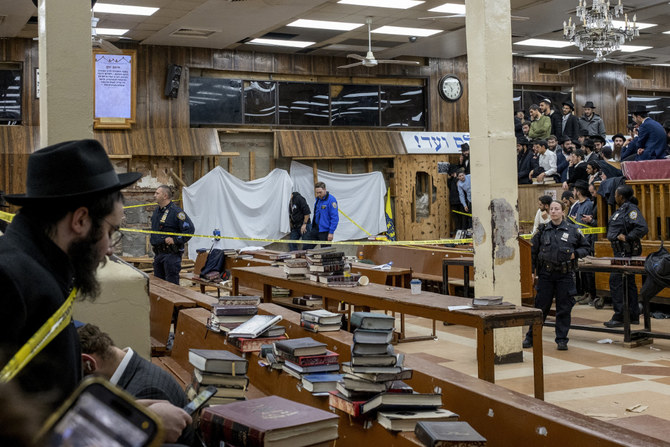NEW YORK: A historic Brooklyn synagogue that serves as the center of an influential Hasidic Jewish movement was trashed this week during an unusual community dispute that began with the discovery of a secret underground tunnel and ended in brawl between worshippers and police.
The conflict erupted in the global headquarters of the Chabad-Lubavitch movement in Crown Heights, a deeply revered Jewish site that each year receives thousands of visitors, including international students and religious leaders. Its Gothic Revival facade, immediately recognizable to adherents of the Chabad movement, has inspired dozens of replicas across the world.
But on Tuesday, the synagogue remained closed off by police barricades as New York City building safety agents inspected whether a tunnel dug without official permission may have caused structural damage to the famed property.
Officials and locals said young men in the community recently built the passage to the sanctuary in secret. When the group’s leaders tried to seal it off Monday, they staged a protest that turned violent as police moved in to make arrests.
The exact purpose and provenance of the tunnel that incited the altercation remained the subject of some debate.
The passageway is believed to have started in the basement of an empty apartment building behind the headquarters, snaking under a series of offices and lecture halls before eventually connecting to the synagogue, according to Motti Seligson, a spokesperson for Chabad.
He characterized its construction as a rogue act of vandalism committed by a group of misguided young men, condemning the “extremists who broke through the wall to the synagogue, vandalizing the sanctuary, in an effort to preserve their unauthorized access.”
Those who supported the tunnel, meanwhile, said they were carrying out an “expansion” plan long envisioned by the former head of the Chabad movement, Rebbe Menachem Mendel Schneerson.
Schneerson led the Chabad-Lubavitch for more than four decades before his death in 1994, reinvigorating a Hasidic religious community that had been devastated by the Holocaust.
Supporters of the expansion said the basement synagogue had long been overcrowded, prompting a push to annex additional space that some in the community felt was taking too long. Many of those supporters subscribe to the messianic belief that Schneerson is still alive.
“That’s what the rabbi wants, that’s what everybody wants,” said Zalmy Grossman, a 21-year-old Brooklyn resident. He said the tunnel project began late last year as a way to connect the synagogue with “the whole empty space” behind it.
Chabad leaders declined to say when they discovered the underground connection. But several worshippers said word of the tunnel’s existence had spread through the community in recent weeks.
The situation came to a head Monday, when a cement truck arrived to seal the opening. Proponents of the tunnel then staged a protest and ripped off the wooden siding of the synagogue.
A police department spokesperson said officers were called to the building in the afternoon to respond to a disorderly group that was trespassing and damaging a wall.
For several hours, police pleaded with the young men to leave the entrance to the tunnel, according to witnesses. After they refused, the officers covered the area with a white curtain and entered the dusty crevasse with zip ties to detain the protesters.
“When they took the first person out with zip ties, that’s when the outburst happened,” said Baruch Dahan, a 21-year-old studying at the synagogue who videotaped the congregants fighting. “Almost everyone was against what they did, but as soon as people saw the handcuffs there was confusion and pushing.”
Footage posted to social media shows scores of onlookers, mostly young men, jeering at the NYPD’s community affairs officers. Some lifted wooden desks into the air, sending prayer books scattering. In response, an officer appeared to deploy an irritating spray to disperse the group.
Nine people — between the ages of 19 and 22 — were ultimately arrested on charges that included criminal mischief, reckless endangerment, and obstructing governmental administration, according to police. Another three received summonses for disorderly conduct.
A spokesperson for the Department of Buildings said the inspection results were pending on Tuesday evening.
While the building remained closed, some worshippers completed their prayers outside in the drizzling rain.
“The community feels terrible,” Dahan said. “It’s a disgrace, instead of expanding, they destroyed.”




























